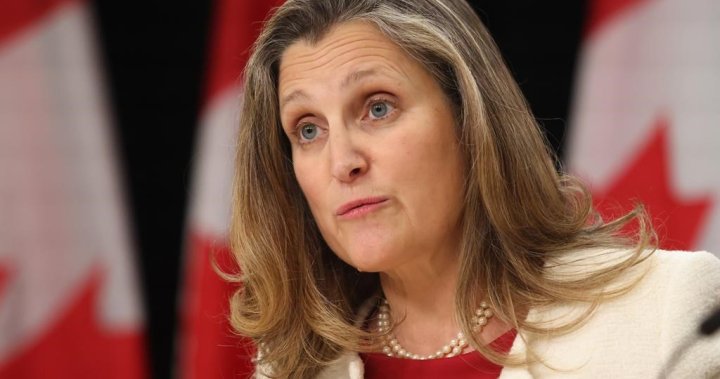Chrystia Freeland’s abrupt resignation as Canada’s Finance Minister has sent shockwaves through the political landscape, raising questions about the stability of the Liberal government and the country’s economic direction. Freeland, in a pointed letter shared on social media, directly attributed her departure to irreconcilable differences with Prime Minister Justin Trudeau, alleging that he had offered her a different cabinet position, a move she deemed unacceptable. This public airing of internal conflict underscores the growing tensions within the Liberal party and potentially foreshadows challenges for Trudeau’s leadership in the future. The timing of the resignation, just hours before the planned release of the fall economic statement, further amplifies the uncertainty surrounding Canada’s economic outlook.
Freeland’s resignation letter not only revealed the internal rift but also highlighted her concerns about the country’s economic vulnerabilities, particularly in the face of rising protectionist sentiments from the United States. She emphasized the need for fiscal prudence and strategic economic planning to counteract the potential negative impacts of US trade policies, specifically mentioning the threat of tariffs. Freeland’s call for a “Team Canada” approach, emphasizing collaboration between the federal government and provinces and territories, underscored her belief in the importance of a united front in navigating these economic challenges. This emphasis on collaborative efforts suggests a potential critique of the current government’s approach and raises questions about the level of internal coordination on economic policy.
The sudden departure of a prominent figure like Freeland, known for her steady hand during the pandemic-induced economic turmoil, inevitably creates a void in the government’s economic leadership. Her warnings about the potential economic fallout from US protectionism and her advocacy for fiscal preparedness will likely resonate, especially given the current global economic uncertainties. Her emphasis on the need to prioritize the interests of Canadians over political maneuvering further underscores the potential differences in approach within the Liberal government, leaving observers to speculate about the specific policy disagreements that led to her resignation.
The resignation also raises questions about the future direction of Canada’s economic policy. Freeland’s focus on fiscal prudence and her concerns about the potential impact of US protectionism suggest a more cautious approach to economic management. The choice of her successor will be a crucial indicator of whether the government intends to maintain this course or adopt a different strategy. The timing of the resignation, immediately preceding the fall economic statement, throws the government’s economic plans into disarray and leaves room for speculation about potential policy shifts.
Freeland’s departure leaves a significant gap in the Liberal cabinet, both in terms of experience and public profile. Her rapid ascent within the party, from newly elected MP to Finance Minister and Deputy Prime Minister in just a few years, speaks to her political acumen and the trust she had garnered within the party. Her resignation not only removes a key player from the government’s economic team but also deprives the Liberal party of a prominent and respected voice. This loss will undoubtedly have implications for the party’s image and its ability to navigate the complex political and economic landscape.
The reactions from other members of the cabinet, including Treasury Board President Anita Anand’s expressions of shock and personal impact, further highlight the significance of Freeland’s departure. The government now faces the challenge of finding a suitable replacement who can not only manage the complex portfolio of Finance Minister but also command the same level of respect and confidence both within the party and among the public. The transition period and the choice of the new Finance Minister will be closely scrutinized, as they will likely signal the government’s future economic priorities and its ability to maintain stability in a time of uncertainty.

